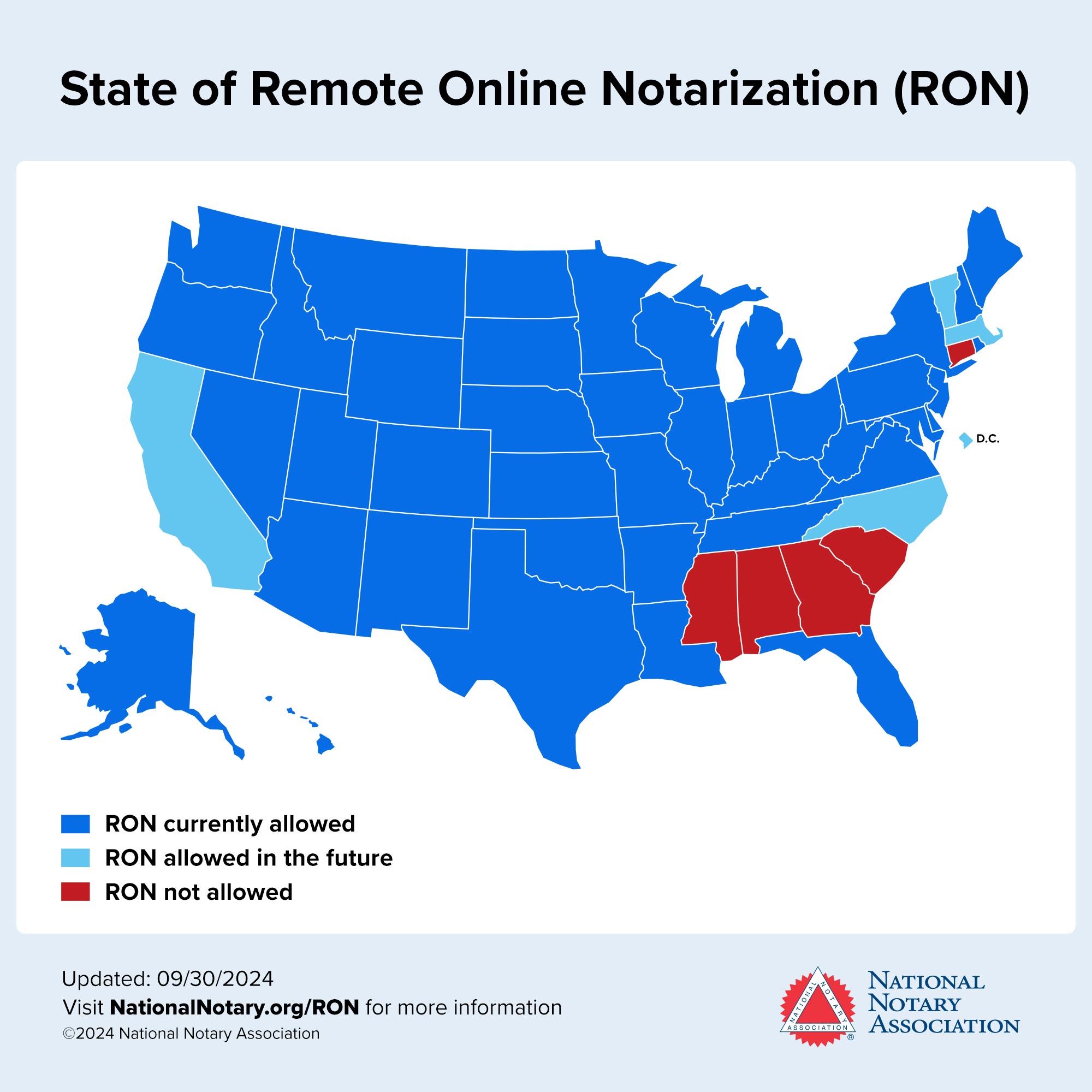Updated 10-4-23.
Editor's note: The NNA has received many calls from Notaries asking about Remote Online Notarization. Please refer to this frequently updated article for guidance first before calling. If you live in a state that has authorized the practice and has rules in place then you may perform remote notarizations. If your state has not authorized RON — or has authorized it but has not put rules in place — then you are not authorized to perform remote notarizations.
As more states pass laws authorizing remote online notarizations, the practice continues to raise questions among Notaries and signers alike. What is remote notarization? Where can it be performed? Who can request it? Can I perform it? What technology is needed?
COVID-19 UPDATE:
In response to the COVID-19 health emergency, a number of states issued emergency measures allowing Notaries to perform remote online notarizations during the crisis. However, most states have let these measures expire or have replaced them with permanent remote notarization laws. For more information and updates, see "States Take Emergency Action On Remote Notarization And Signers' ID."
Here are answers to the most common questions.
What is remote notarization?
With remote notarization, a signer personally appears before the Notary at the time of the notarization using audio-visual technology over the internet instead of being physically present in the same room. Remote online notarization is also called webcam notarization, online notarization or virtual notarization.
Is remote notarization the same as electronic notarization?
Many people confuse electronic notarization with remote notarization, believing they are the same. They are not.
Electronic notarization, or eNotarization, involves documents that are notarized in electronic form, and the Notary and document signer sign with an electronic signature. But all other elements of a traditional, paper notarization apply to electronic notarization, including the requirement for the signer to physically appear before the Notary.
The confusion arises from the fact that remote notarizations typically involve digital documents that are signed and notarized electronically. However they go a step further in that the transaction is conducted online rather than in person.
What states allow remote notarization?
Currently, 47 states have passed remote notarization laws. Those states include Alabama, Alaska, Arizona, Arkansas, California, Colorado, Connecticut, Delaware, Florida, Hawaii, Idaho, Illinois, Indiana, Iowa, Kansas, Kentucky, Louisiana, Maine, Maryland, Massachussetts, Michigan, Minnesota, Missouri, Montana, Nebraska, Nevada, New Hampshire, New Jersey, New Mexico, New York, North Carolina, North Dakota, Ohio, Oklahoma, Oregon, Pennsylvania, Rhode Island, South Dakota, Tennessee, Texas, Utah, Vermont, Virginia, Washington, West Virginia, Wisconsin and Wyoming.
The District of Columbia has also enacted permanent remote notarization laws.

Will other states permit remote notarizations in the future?
As other states enact new remote notarization laws, we will continue to update this FAQ.
How do I prepare for remote notarization?
If you live in a state that has authorized remote notarization, simply follow the requirements of that state. Select your state from the drop-down on this page to learn more about your state's remote Notary laws.
What kind of technology will I need to perform remote notarizations?
Each state that authorizes remote notarizations may establish its own technology standards and requirements.
There are a number of technology companies that offer end-to-end remote notarization systems. They include DocVerify, Nexsys (this company primarily works with businesses), Notarize, NotaryCam, NotaryLive, OneNotary, OnlineNotary.us, Pavaso, Safedocs and SIGNiX.
In practical terms, signing up with one or more of these companies will provide most online Notaries with the technology they need.
You can find more information on your state's specific technology provider requirements and a list of approved providers (if any) on your state's Notary agency website. Other providers may not be listed but may be used if they meet your state's statutory requirements. Please note: Some states may not provide a list of approved vendors and the NNA does not endorse a specific provider.
Will being a remote Notary increase my market value?
If you are a mobile Notary, adding services to your business offerings may increase your value, but it depends on the market and customers you serve.
How will clients know I am a remote Notary?
Some remote notarization system companies market their services directly to the public, so you don't have to. A couple of the companies also have apps in the Apple App Store and on Google Play. A person who needs to have a document remotely notarized downloads the app, pays the fee and is connected to a remote Notary who can help them.
In these cases, companies function like signing services. Customers come to them for a notarization, and they schedule a remote Notary through their system. Typically, when you sign up, they will ask you when you are available to perform remote notarizations. You'll be paid a portion of the maximum fee for the remote notarization that the company collects from the signer through the app.
If you use a technology company that doesn't market directly to the public, you will need to market yourself to potential clients just like you do today for paper notarizations.
Can I list that I perform remote notarizations on my SigningAgent.com profile?
Yes. Every profile has an "Additional Information" section where you can put other qualifications and services. Go ahead and list it there.
Related Articles:
How to perform a remote online notarization
Remote notarization vs. traditional notarization
Additional Resources:
Model Notary Act of 2022
NNA Knowledge Center Remote Notarization Resources